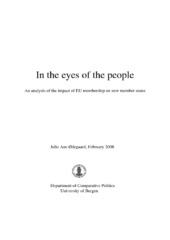In the eyes of the people. An analysis of the impact of EU membership on new member states
Abstract
This study analyzes the impact of EU membership on new member states. The focus is on thecitizens’ perceptions of the benefits of EU membership taking the eastwards expansion in 2004as a point of departure. Considering the maze of complexities linked to the countries differentpolitical, economic and historical contexts, this enlargement is an especially tangled case. Thequestion addressed is: What can explain whether or not the EU membership is considered acountry benefit?The economic and political dimensions are analyzed to explore which impact they have on howthe citizens evaluate the benefits of EU membership as these two dimensions are expected to beof particular importance to them. The Central and Eastern European countries in addition to thetwo Mediterranean states, Cyprus and Malta are examined.The results of the comparative analysis show that the economic dimension has the strongesteffect of the two as the economic variables are important to the citizens in all of the ten memberstates. The political dimension, on the other hand, does not have the same equivalent impact. InEstonia for instance the political variables do not have any effect on the citizens’ evaluation ofthe benefits of the membership. Also, it does not matter to the citizens in any of the countrieswhether or not the EU is considered to be promoting human rights, except for in the CzechRepublic and Slovakia. Therefore, this study questions the use of Western European theoreticalmodels on the Eastern European world and argues that perhaps other factors might have strongereffects than those of the political dimension.Nevertheless, the analysis of the impact of EU membership on the ten new member states whichjoined in 2004 indicates that the political and economic variables are indeed of importance whenseeking to understand how the new EU citizens evaluate the benefits of the EU membership.
Publisher
The University of BergenCopyright
The authorCopyright the author. All rights reserved
